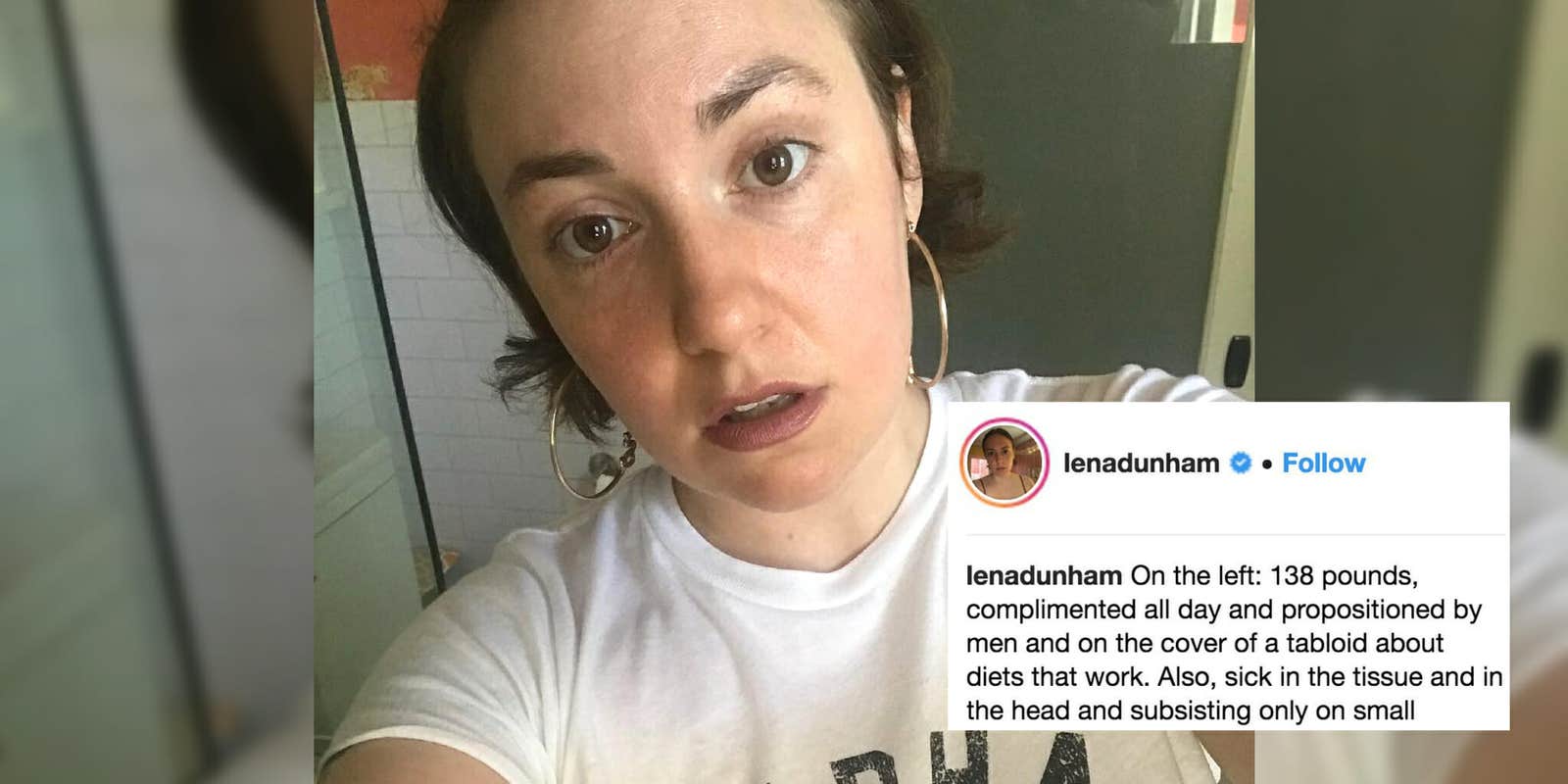Point blank, the entertainment and media industries in the U.S. still value Eurocentric features, light skin, conventional beauty, thinness, cisgender, and able bodies. Yes, even though in the last decade we’ve witnessed strides for change and efforts to represent people of all backgrounds, the status quo remains.
But despite the ways in which certain bodies experience privilege over others, even privileged bodies suffer and aren’t always bodies to covet after. Lena Dunham’s latest Instagram post about her own body is a gentle, reassuring reminder of that.
On July 10, Dunham shared a post featuring photos of her side-by-side, one taken days ago and posted to the celebrity blog Just Jared, the other taken sometime within the past year. In the left photo, the older image, Dunham wrote that she was 138 pounds. The photo reflected weight loss that the media had sensationalized last year, publishing pieces on how Dunham lost weight with the help of a fitness professional, and why she was tired of people “shaming” her for losing weight.
In the photo on the right, taken just days ago, she wrote that she weighs 162 pounds—more plainly, she had gained 24 pounds since the previous photo was taken. In the time following the media’s praise of her change in her body, Dunham continued to struggle with health issues, particularly her mental health, chronic pain, and endometriosis.
In her post, Dunham admitted that while she’s been a long-time champion of body positivity, she still looked at the body she had one year ago “longingly,” but that she reminds herself that she experienced life very differently at that period of her life versus now.
At 138 pounds, she was “complimented all day and propositioned by men and on the cover of a tabloid about diets that work.” But despite all the praise, she was also “sick in the tissue and in the head and subsisting only on small amounts of sugar, tons of caffeine and a purse pharmacy.”
But at the weight she currently is, she wrote that she’s “happy joyous & free, complimented only by people that matter for reasons that matter, subsisting on a steady flow of fun/healthy snacks and apps and entrees, strong from lifting dogs and spirits.”
Yes, between the two moments of her life, even when she looks back and thinks that she’d prefer to be thin, she knows that beneath the skin of her socially-accepted body was someone experiencing great pain.
“Even this OG body positivity warrior sometimes looks at the left picture longingly, until I remember the impossible pain that brought me there and onto my proverbial knees,” Dunham wrote.
Instagrammed about feeling v free in my healthy body then burned my tongue eating soup too fast and can barely wrap my head around drinking seltzer- so what’s the universe even up to? 🍲 🔮 I love you all, you make me happy.
— Lena Dunham (@lenadunham) July 10, 2018
Without a doubt, Dunham is a controversial figure, to say the least. In the past year, a writer quit from her newsletter after accusing Dunham of “hipster racism,” Dunham supported a writer on her show Girls whom a young actress said sexually assaulted her as a teenager (though she later retracted her statement and apologized), and has been called out for her lack of involvement in Time’s Up. But Dunham’s followers have taken note of the positive sentiment praising acceptance of happiness within bodies that may not be quite the social norm.
“A hero to us hyster-sisters!” one person commented, referencing Dunham’s hysterectomy procedure she had as a result of her endometriosis.
“What a beautiful powerful inspiring, super smart goddess you are. You are such an inspiration. Stay happy, joyous and free. [Your] voice is heard,” another person commented.
Dunham’s post isn’t necessarily of the variety that flippantly argues “skinny people have problems, too,” or attempts to distort the kind of privilege that socially accepted bodies have. And yes, some may qualify her post by saying she’s not necessarily “brave” for existing in a world that she may still be able to physically move through with little consequence. But her sentiment still stands.
This reality check, being in tune with your own health and happiness even at times when you project the epitome of beauty standards, is necessary, particularly for people who may be new to gaining weight or seeing changes in our bodies. Growing up with U.S. culture, we’re told how bodies are “supposed” to look, to the point where even if we come from a place of body privilege, be it size, race, or gender, we still have to unlearn those beauty standards in the effort to love ourselves and others regardless.
“As I type I can feel my back fat rolling up under my shoulder blades,” Dunham concluded her post. “I lean in.”
H/T BuzzFeed


